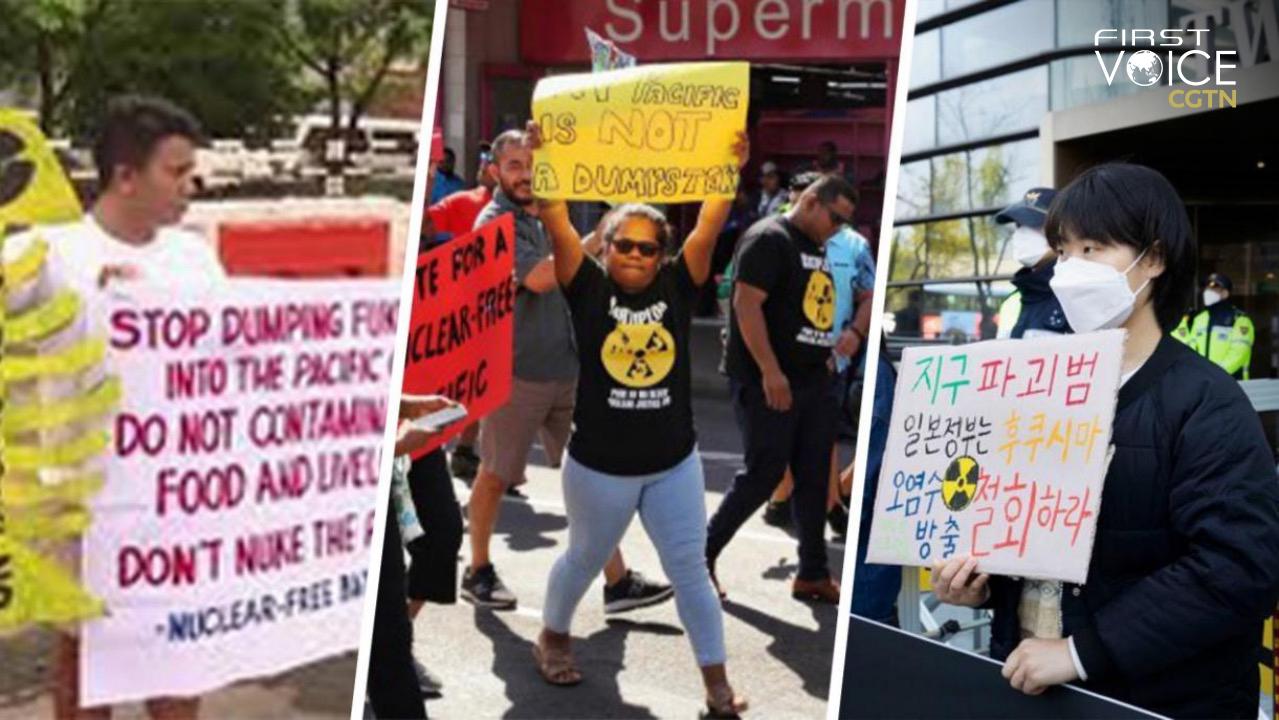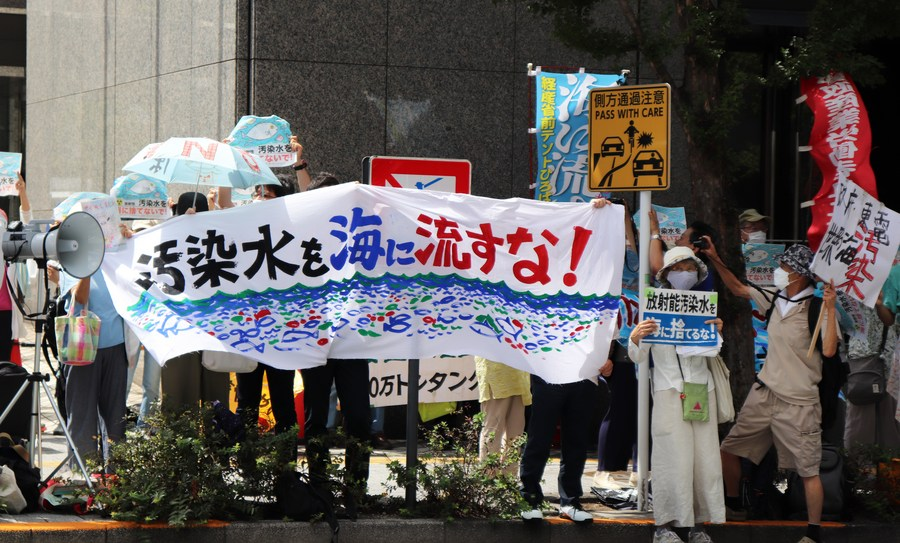
Editor's note: CGTN's First Voice provides instant commentary on breaking stories. The column clarifies emerging issues and better defines the news agenda, offering a Chinese perspective on the latest global events.
The Japanese government insists on dumping nuclear-contaminated water into the Pacific Ocean starting from August 24, putting marine safety and people's health at risk. While the move has triggered global concern, some Western media outlets including VOA and CNN hype that only China has voiced opposition to Japan's discharge.
Is China the only country against Japan's release? The answer is absolutely no. Public from a slew of countries including Japan have voiced their strong dissatisfaction. Japanese citizens spontaneously took to the streets and submitted petitions against the water release. Waves of protests have spread across Japan with no sign of dying down. Hideki Taki, one of the demonstrations' organizers, expressed his extreme anger against the Japanese government's unilateral move to push forward with the release.
Japan's release of nuclear-contaminated water has spurred protests in South Korea, the Philippines, and Fiji as well. Lee Jae-myung, leader of South Korea's Democratic Party, said Japan crossed a line that it should not have crossed. "The issue of discharging polluted water is a provocation to all of us, the people of the Earth," Lee said in an interview with Bloomberg. Philippine environmentalists and fishermen denounced Japan's move as a "huge gamble that ventures people's lives" and urged the international community to act against Japan's discharge that is turning the ocean into a waste yard.
Fiji citizens voiced strong dissatisfaction against Japan's "horrendous and horrible" move. "It's a disrespect to our rights as human beings," said Lusia Lagilevo, a protester in Fiji, adding "although we are from small island countries, we still deserve to have our rights, our dignity and our freedoms respected." A number of other Pacific countries also claimed that Japan should dump the nuclear-contaminated water onto its own soil, instead into the Pacific Ocean. Germany's Federal Environment Minister said that she is extremely critical of any additional discharge of radioactive substances into the sea.

People gather to protest the Japanese government and Tokyo Electric Power Company's (TEPCO) decision on releasing nuclear-contaminated water in front of the headquarters of the TEPCO in Tokyo, Japan, August 24, 2023. [Photo/Xinhua]
In the meanwhile, scientists have voiced their suspicions on the safety of Japan's release. The American Association for the Advancement of Science, headquartered in Washington, warned in a report published in Science in 2021 that more dangerous isotopes with longer radioactive lifespans – ruthenium, cobalt, strontium, and plutonium – can slip through the ALPS (Advanced Liquid Processing System) process at times.
In the article "Is Fukushima wastewater release safe? What the science says" published in Nature in June, marine biologist Robert Richmond from the University of Hawaii asked: "Have the people promoting this (Japan's discharge of the nuclear-contaminated water)... demonstrated to our satisfaction that it will be safe for ocean health and human health?" "The answer is no," Richmond said. As one of five scientists on a panel advising the Pacific Islands Forum, Richmond said after reviewing data from TEPCO and the Japanese government, and visiting the Fukushima nuclear plant, their suspicions of the discharge have not been addressed.

People protest against the Japanese government's plan to discharge nuclear-contaminated water into the sea in Fukushima, Japan, June 20, 2023. [Photo/Xinhua]
But interestingly, voices opposing Japan's release seem to have been muted in Western media outlets. Is the West deliberately turning deaf to these voices? Recently, a vlogger interviewed 20 people at random on American streets. Only one interviewee, who is from South Korea, knows about Japan's release of nuclear-contaminated water, while others know nothing about the discharge and have not seen any report about it from local media.
While making a fuss about China's opposition stance and accusing the country of playing a "geopolitical" game on the issue, Western media are deliberately playing down the perils of Japan's discharge, not even informing the public of the release. Certain Western countries' double standards and biases are not news. The hype that only China has opposed to Japan's discharge is just one example. The West exerts double standards on bio-environment issues for political gains, but it is the public that is paying the price.

 中文
中文



